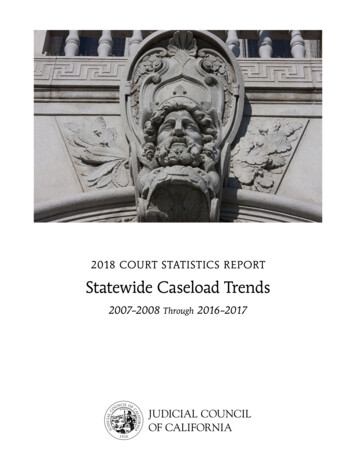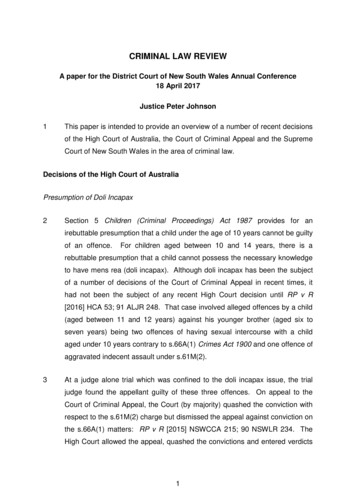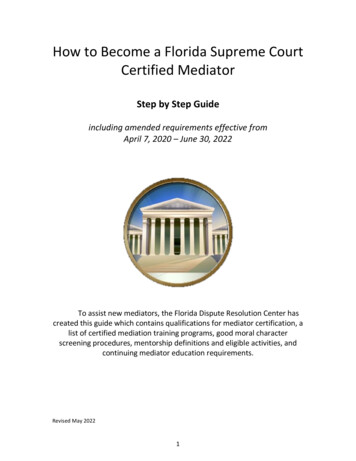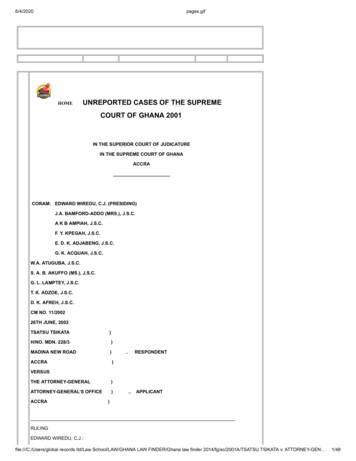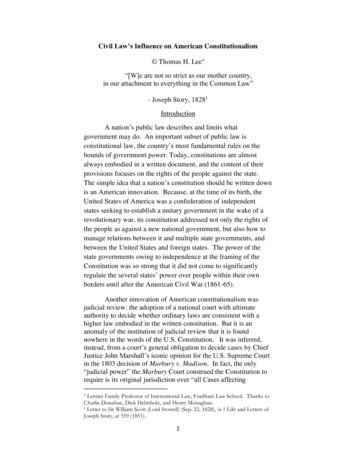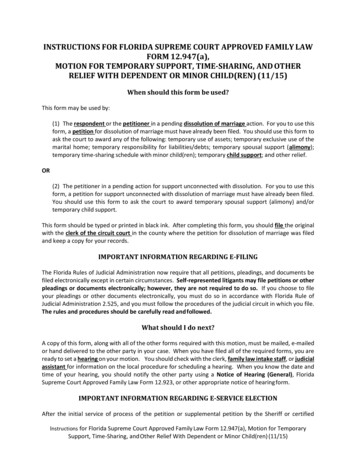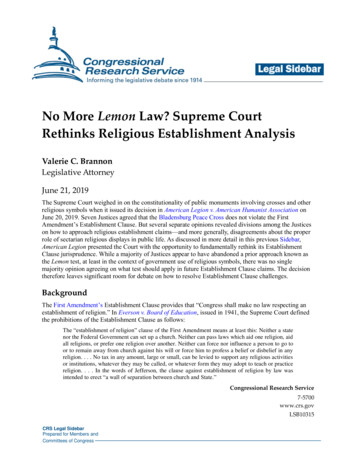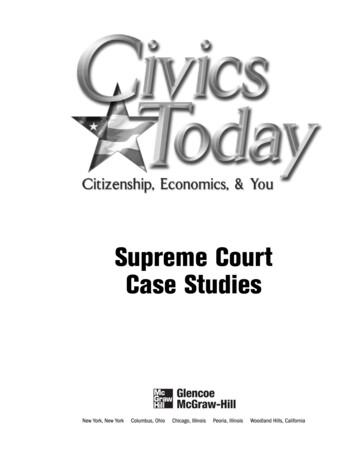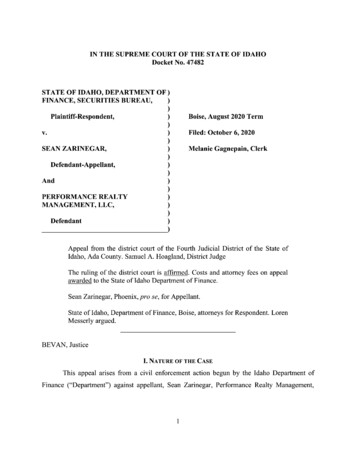
Transcription
IN THE SUPREME COURT OF THE STATE OF IDAHODocket No. 4 7482STATE OF IDAHO, DEPARTMENT OF)FINANCE, SECURITIES BUREAU,))Plaintiff-Respondent,)) ))SEAN ZARINEGAR,))Defendant-Appellant,))And))PERFORMANCE REAL TY)MANAGEMENT, LLC,))Defendant)Boise, August 2020 TermFiled: October 6, 2020Melanie Gagnepain, ClerkAppeal from the district court of the Fourth Judicial District of the State ofIdaho, Ada County. Samuel A. Hoagland, District JudgeThe ruling of the district court is affirmed. Costs and attorney fees on appealawarded to the State of Idaho Department of Finance.Sean Zarinegar, Phoenix, prose, for Appellant.State of Idaho, Department of Finance, Boise, attorneys for Respondent. LorenMesserly argued.BEVAN, JusticeI. NATURE OF THE CASEThis appeal arises from a civil enforcement action begun by the Idaho Department ofFinance ("Department") against appellant, Sean Zarinegar, Performance Realty Management,1
LLC ("PRM"), and other nominal defendants. 1 The complaint alleged Zarinegar and PRMcommitted securities fraud in violation of Idaho Code sections 30-14-501(2) and 30-14-501(4).The Department moved for summary judgment. Zarinegar and PRM responded with their ownmotion for partial summary judgment and a motion to strike several documents submitted by theDepartment in support of its motion for summary judgment. A few days before the district courtwas set to hear arguments on the motions, counsel for Zarinegar and PRM moved the district courtfor leave to withdraw as counsel of record. At the hearing, the district court preliminary denied themotion to withdraw, entertained the parties' arguments, and took all matters under advisement.The district court later issued its memorandum decision and order denying, in part,Zarinegar's, and PRM's motions to strike. The district court also denied Zarinegar's and PRM'smotion for partial summary judgment. The district court granted summary judgment for theDepartment after finding Zarinegar and PRM had misrepresented and omitted material facts inviolation of section 30-14-501 (2) and fraudulently diverted investor funds for personal use inviolation of section 30-14-501(4). The district court then granted the motion to withdraw. Thedistrict court entered its final judgment against Zarinegar and PRM on September 30, 2019.Zarinegar, representing himself pro se, appealed the judgment. Zarinegar argues: (1) the districtcourt lacked jurisdiction to enter judgment against him; (2) the district court violated hisconstitutional right to a jury trial and right to proceed pro se; (3) the district court's denial ofZarinegar' s motions to strike as to certain documents was an abuse of discretion; and (4) the districtcourt erroneously granted summary judgment for the Department. For the reasons discussedbelow, we affirm.II. FACTUAL AND PROCEDURAL BACKGROUNDOn July 5, 2007, the Alabama Securities Commission issued a Cease and Desist Order("Alabama Order") against multiple respondents, including Zarinegar. The Alabama Orderencompassed almost twenty pages of factual findings related to an investigation and audit ofMalory Investments, LLC ("Malory"), a company which employed Zarinegar until 2005. TheAlabama Order concluded that the respondents, including Zarinegar, committed multiple securitiesviolations. Based on these findings, the Alabama Securities Commission ordered respondents,1The complaint listed the following nominal defendants: 1) CBA Capital, Incorporated; 2) Premium PerformanceGroup, LLC; 3) CORIX BIOSCIENCE, INCORPORATED; 4) KoriZ, LLC; and 5) Kori Kay Zarinegar. The nominaldefendants were later dismissed by stipulation.2
including Zarinegar, to immediately cease and desist from offering or selling securities into,within, or from Alabama.The next day, the Kansas Securities Commission also issued a Cease and Desist Order("Kansas Order") against multiple respondents, including Zarinegar. The Kansas Order, like theAlabama Order, included over twenty pages of factual findings related to an investigation andaudit of Malory. The Kansas Order concluded that the respondents, including Zarinegar, violatedmultiple sections of the Kansas Securities Act. Relevant to the actions underlying this case, theKansas Order found Zarinegar, in connection with the offer, sale or purchase of securities, hadengaged in multiple misrepresentations. Based on these findings, the Kansas SecuritiesCommission ordered the respondents, including Zarinegar, to immediately cease and desist fromsoliciting offers to buy or making offers to sell securities until certain requirements related toappropriate registration in Kansas were satisfied.The Kansas Order provided that a respondent could contest the order by requesting ahearing, but Zarinegar waived his right to a hearing by signing a Stipulation for Consent Order,permitting the Kansas Securities Commission to issue a binding order against him. The KansasSecurities Commission then issued a Consent Order, ordering Zarinegar to cease and desist from"soliciting offers to buy or making offers to sell, or effectuating or transacting sales of securities,or the securities of any other person or issuer, or directly or indirectly aiding and assisting in thesame or attempting to do the same" until certain requirements related to proper registration weresatisfied.Despite the Alabama Order, the Kansas Order, the Stipulation for Consent Order, and theKansas Consent Order (collectively, "Orders"), Zarinegar continued selling securities. On October21, 2009, Zarinegar organized PRM as a limited liability company in Arizona. PRM' s Articles ofOrganization list Zarinegar as the sole manager of the company and vested all management ofPRM in Zarinegar. On September 3, 2013, American Realty Partners, LLC, ("ARP") alsoorganized as a limited liability company in Arizona. ARP's Articles of Organization list PRM asthe sole manager of the company and vest all management of ARP in PRM.3
In early 2014, Jack Combs, a managing partner of PRM, solicited Idaho resident JamesRees with investment opportunities in ARP. 2 Combs introduced the investment to Rees throughARP' s Private Placement Memorandum ("Memorandum"). 3 The Memorandum provided: "[ARP]was formed . to (i) acquire, finance, own, refinance, maintain, improve, develop, construct,lease, manage, sell, exchange, or otherwise dispose of residential and/or commercial real property. and (ii) engage in such other activities as are reasonably incidental to the foregoing." ARP'sMemorandum teems with statements related to operating ARP's business by acquiring, renovating,leasing, and managing residential real estate. Rees made his initial investment at that time.About a year after Rees' initial investment, ARP converted to American Housing IncomeTrust, Incorporated ("AHIT"), through a Plan of Conversion and Stock Exchange Agreementapproved by the Financial Industry Regulatory Authority. 4 The closing of the exchange agreementled ARP to become a wholly-owned subsidiary of AHIT with PRM continuing to act as itsmanager. All units of ARP were automatically exchanged for shares in AHIT. Following theconversion from ARP to AHIT, a letter was sent to Rees explaining that the conversion wouldallow ARP to "capture a larger piece of the ever-growing residential real estate market and to gainbetter recognition as a player in this competitive space." Moreover, publicly filed documents stateAHIT continued "in the business of acquiring and operating residential properties" and retainedARP' s intention of eventually operating as a Real Estate Investment Trust ("REIT"). 52The background information related to ARP is included to provide how Rees' investment in PRM came to be;however, the Department did not launch a civil enforcement action against ARP or its related offerings.3A private placement is "[a] securities offering exempt from registration with the SEC . " SEC, Investor Bulletin:Private Placements Under Regulation D, INVESTOR.GOV. (Sept. 24, 2014), or-bulletins-31. "In practice, issuers often provide adocument called a private placement memorandum . that introduces the investment and discloses information aboutthe securities offering and the issuer." Id.4The Securities Exchange Act of 1934 created the Securities and Exchange Commission. The Laws that Govern theSecurities Industry, SEC.GOV, ecact1933 (last modified Oct. 1,2013). "The Act empowers the SEC with broad authority over all aspects of the securities industry." Id. Thus, the SECis responsible for regulating self-regulatory organizations. Id. The Financial Industry Regulatory Authority ("FINRA")is a self-regulatory organization "authorized by Congress to protect America's investors by making sure the brokerdealer industry operates fairly and honestly." About FINRA, FINRA.ORG, https://www.finra.org/about (last visited Sept.4, 2020).5In general, a REIT is a corporation, association, or trust that is subject to and meets the requirements of section 856of the Internal Revenue Code and is "managed by one or more trustees or directors," has "beneficial ownership ofwhich is evidenced by transferable shares, or by transferable certificates of beneficial interest," which is generally"taxable as a domestic corporation," is not a financial institution or an insurance company and has the "beneficialownership of which is held by 100 or more persons." See 26 U.S.C.A. § 856; see also Civil Rights Educ. & Enf't Ctr.4
PRM's Memorandum, which PRM later provided to Rees, also provided severalrepresentations, disclaimers, and disclosures about the securities PRM offered. PRM' sMemorandum provided that PRM's sole asset was 1,000,000 shares of common stock in AHIT.That said, the Memorandum explicitly stated in a footnote: "[ a]!though not made a part of anyrepresentation in connection with this Offering, background information related to the relationshipbetween AHIT,[ARP]and[PRM]aredetailedin AHIT'spublicdisclosuresatwww.sec.gov/edgar . "As to the business activities of PRM, the Memorandum provided PRM was "devoted toreal estate management, acquisition and investor relations for its related-entities, such as [ARP andAHIT]. . " PRM's Operating Agreement elaborated on that purpose:The business and purpose of [PRM] is to (i) manage, maintain, improve, develop,construct, lease, manage, sell, exchange, or otherwise dispose of residential and/orcommercial real property for the benefit of third-parties, related or not, affiliated ornot, regardless of location, either directly or indirectly through one or moresubsidiary entities; (ii) engage in such other activities as are reasonably incidentalto the forgoing; and (iii) engage in and do any act concerning any or all lawfulbusinesses for which limited liability companies may be organized under Arizonalaw[.]The Operating Agreement vested in Zarinegar, as the sole manager of PRM, the power to "direct,manage, and control the business of [PRM]" and granted "full and complete authority, power, anddirection to make any and all decisions and to do any and all things that [Zarinegar] deem[ ed] tobe reasonably required to accomplish the business and objectives of [PRM]." Although grantedwith broad authority to manage PRM, Zarinegar, as manager, was required "[t]o hold and own any[PRM] real or personal properties in the name of [PRM]."By May 2015, Rees' total investment in ARP amounted to 300,000. Through theconversion of ARP to AHIT, Rees' ARP units converted to 172,811 shares of common stock inAHIT. Rees continued to invest after the conversion and on November 25, 2015, Rees wiretransferred 172,283.03 to PRM's Wells Fargo account ending in 1692. On December 16, 2015,unbeknownst to Rees, 175,000 was electronically transferred from PRM's account to Zarinegar'spersonal Wells Fargo account ending in 3345. The next day, December 17, 2015, the 175,000was transferred from Zarinegar's Wells Fargo account to Zarinegar's Ameritrade account endingv. Hosp. Props. Tr., 867 F.3d 1093, 1096 (9th Cir. 2017) ("REITs are vehicles for investors to own a fraction of agroup of real estate holdings.").5
in 0250. Zarinegar then made over five hundred debit card transactions from the Ameritradeaccount. By February 2016, Rees held 340,011 shares of common stock in AHIT, totaling aninvestment of 550,800.03.On January 11, 2016, over a month after its initial presence in Idaho, PRM filed its NoticeFiling for Regulation D Rule 505 ("Form D") with the Department. On January 19, 2016, almosttwo years after Rees' initial investment in ARP and a month after Rees' investment in PRM, AHITfiled its "Form S-11/A Registration Statement" ("Form S-11/A") with the SEC. In that filing,AHIT disclosed the Orders entered against Zarinegar in Alabama and Kansas.In March 2017, AHIT purchased IX Biotechnology, Incorporated, a company focused onthe production of certified organic cannabidiol oil (CBD). IX Biotechnology, Incorporated laterchanged its name to Corix Bioscience, Incorporated, ("Corix"). The goal of the purchase was tobecome the largest producer of CBD in the United States. As a result, Rees' 340,011 shares inAHIT were converted to 340,011 shares in Corix.Procedurally, this case arose after PRM filed its Form D with the Department on January11, 2016. Because of irregularities with the filing, the Department inquired into PRM. That inquiryeventually became an investigation. Based on its findings, the Department filed a complaint againstZarinegar, PRM, and the other nominal defendants pursuant to Idaho Code section 30-14-603. Thecomplaint alleged Zarinegar, as manager of PRM, misrepresented and omitted material facts inconnection with selling securities in violation ofldaho Code section 30-14-501 (2). The complaintalso alleged Zarinegar fraudulently diverted investor funds in violation of Idaho Code section 3014-501 (4). The complaint sought: (1) judgment confirming Zarinegar had violated the IdahoUniform Securities Act ("IUSA"), as set forth in Idaho Code section 30-14-101 et seq.; (2) apermanent injunction to prohibit Zarinegar from engaging in the act of selling or offering securitiesin Idaho (3) restitution for Rees in the amount of 550,800.03; and (4) a civil fine of 20,000.The Department moved for summary judgment. Zarinegar and PRM responded with a crossmotion for partial-summary judgment on the alleged violation of section 30-14-501(2). In addition,Zarinegar and PRM moved to strike affidavits submitted by the Department in support of itsmotion for summary judgment. Shortly before all motions were set to be heard, counsel forZarinegar and PRM filed a motion for leave to withdraw. At the hearing on the motions, the districtcourt delayed ruling on counsel's motion for leave to withdraw, heard the parties' arguments, andtook all matters under advisement. The district court issued its written decision and order on July6
7, 2019, ruling: (1) denying in part and granting in part Zarinegar's motions to strike; (2) grantingsummary judgment for the Department; (3) denying Zarinegar's partial summary judgmentmotion; and (4) granting the motion for Zarinegar's counsel to withdraw.After the district court issued its memorandum decision and order, Zarinegar, appearingpro se, continued to file numerous documents with the court. The Department moved the districtcourt to enter judgment against Zarinegar and PRM. The district court heard the parties' argumentson September 30, 2019. It then entered judgment against Zarinegar and PRM, enjoining them fromissuing, offering or selling securities in Idaho. The court also ordered Zarinegar and PRM to pay 550,800 to the Department on Rees' behalf, and imposed 20,000 in civil penalties uponZarinegar and PRM. Zarinegar appealed.Ill. ISSUES ON APPEAL1.Whether the district court had jurisdiction to enter judgment against Zarinegar?2.Whether the district court violated Zarinegar' s constitutional right to a jury trial or impliedright to proceed prose?3.Whether the district court's denial of some of Zarinegar's motions to strike was an abuseof discretion?4.Whether the district court's grant of summary judgment for the Department was erroneous?IV. STANDARD OF REVIEWThe standards of review directly relevant to each argument on appeal will be addressedbelow as pertinent to the analysis of those claims.V.ANALYSISZarinegar asserts several errors on appeal. First, Zarinegar argues the district court did nothave jurisdiction to enter judgment against him. Second, Zarinegar argues the district courtviolated his constitutional right to a jury trial and implied right to proceed pro se. Third, Zarinegarargues the district court abused its discretion when it failed to grant his motions to strike in theirentireties. Last, Zarinegar argues the district court's grant of summary judgment for theDepartment was erroneous.A.The district court had jurisdiction to enter judgment against Zarinegar.The district court found Zarinegar violated the IUSA by misrepresenting and omittingmaterial facts in connection with offering and selling securities and by fraudulently divertinginvestor funds for his own personal expenses. As a result, the district court entered judgmentagainst Zarinegar. Zarinegar argues the district court lacked jurisdiction to enter judgment against7
him. He maintains the district court lacked personal jurisdiction because he did not make anycontact with Idaho nor did he waive personal jurisdiction. Zarinegar also argues the district courtlacked subject matter jurisdiction because the proceeding below was criminal in nature and therewas no filing of an information, indictment, or complaint, alleging an offense was committed inIdaho."The question of the existence of personal jurisdiction over an out-of-state defendant isone oflaw, which this Court reviews freely." Dickinson Frozen Food, Inc. v. J.R. Simplot Co., 164Idaho 669, 677, 434 P.3d 1275, 1283 (2019) (quoting Knutsen v. Cloud, 142 Idaho 148, 150, 124P .3d 1024, 1026 (2005) ). A party may assert as a defense that the district court lacks personaljurisdiction. See I.R.C.P. 12(b)(2). However, "[a] party waives any defense listed in subsection(b )(2) . by failing to assert it by motion before filing a responsive pleading or filing any othermotion . " See I.R.C.P. 12(h)(l). "The voluntary appearance of a party or service of any pleadingby the party . constitutes a voluntary submission to the personal jurisdiction of the court."I.R.C.P. 4.l(a); see also State v. Aguilar, 103 Idaho 578,580,651 P.2d 512,514 (1982) (holdinga defendant consents to the court's personal jurisdiction when the defendant fails to "object or raiseas an affirmative defense the asserted lack of personal jurisdiction over him as required underI.R.C.P . 12(h), and participated in the proceeding.").Zarinegar, through his attorneys of record, appeared and answered the allegations theDepartment made against him. The attorneys did not file a special appearance to contestjurisdiction under I.R.C.P. 4.l(b); thus, Zarinegar voluntarily submitted to the district court'spersonal jurisdiction. I.R.C.P. 4.1.(a). In addition, in his answer, Zarinegar listed ten affirmativedefenses, but failed to assert that the district court lacked personal jurisdiction, as would berequired to preserve the defense under I.R.C.P. 12(h)(l). Thus, Zarinegar waived the defense thatthe district court lacked personal jurisdiction.Zarinegar also submitted to personal jurisdiction in Idaho through multiple filings hesubmitted on behalf of PRM. In December 2015, Zarinegar signed a Form D as "president" ofPRM which was filed with the SEC. Form D specifies the issuer, by signing the form, appoints thesecurity administrator of any state "in which th[ e] notice is filed, as its agents for service of process,and agree[ s] that these persons may accept service on its behalf, of any notice, process or pleading. " if an action arises from the sale of securities in that state. In addition, after the first sale of8
PRM securities to Rees, PRM submitted its Form D with Idaho. Attached to the filing is Idaho's"Form U-2 Uniform Consent to Service of Process." That form specifies:[T]he undersigned does hereby consent that any such action or proceeding againstit may be commenced in any court of competent jurisdiction and proper venuewithin the States so designated hereunder by service of process upon the officersso designated with the same effect as if the undersigned was organized or createdunder the laws of that State and have been served lawfully with process in thatState.Zarinegar signed the form as an executive officer of PRM and checked the director of Idaho'sDepartment of Finance to be appointed as the designated officer as PRM' s attorney in Idaho forreceipt of service of process. For these reasons, we hold the district court had personal jurisdictionover Zarinegar.As to subject matter jurisdiction, Zarinegar argues the district court lacked subject matterjurisdiction because the proceeding was criminal and an information or indictment was not filedagainst him. This Court also reviews freely whether the court had subject matter jurisdiction. SeeWestover v. Idaho Cntys. Risk Mgmt. Program, 164 Idaho 385,388,430 P.3d 1284, 1287 (2018)("Jurisdictional issues, like [I.R.C.P. 12(b)(l) challenges] are questions of law, over which thisCourt exercises free review.")."The district court shall have original jurisdiction in all cases, both at law and in equity."IDAHO CONST. art. V, § 20. "This Court has adopted a presumption that courts of generaljurisdiction have subject matter jurisdiction unless a party can show otherwise." Troupis v.Summer, 148 Idaho 77, 80, 218 P.3d 1138, 1141 (2009).Jurisdiction over the subject matter is the right of the court to exercise judicialpower over that class of cases; not the particular case before it, but rather theabstract power to try a case of the kind of character of the one pending; and notwhether the particular case is one that presents a cause of action, or under theparticular facts is triable before the court in which it is pending, because of some ofthe inherent facts that exist and may be developed during trial.Id. at 79-80, 218 P.3d at 1140--41 (quoting Richardson v. Ruddy, 15 Idaho 488, 494-95, 98 P. 842,844 (1908)). "Subject matter jurisdiction is a key requirement for the justiciability of a claim andcannot be waived . ."Id.at 79, 218 P.3d at 1140.Here, based on its investigation into Zarinegar, the Department believed Zarinegar hadmisrepresented or omitted material facts in violation of Idaho Code section 30-14-501 (2). TheDepartment also believed Zarinegar diverted Rees' investor funds to his own personal use in9
violation ofldaho Code section 30-14-501(4). The IUSA grants the Department authority to bringcivil enforcement actions against any person who the Department believes violates securities lawin Idaho. See I.C. § 30-14-603.If the administrator believes that a person has engaged, is engaging, or is about toengage in an act, practice, or course of business constituting a violation of [theIUSA] or that a person has, is, or is about to engage in an act, practice, or course ofbusiness that materially aids a violation of [the IUSA] . the administrator maymaintain an action in any court ofcompetent jurisdiction to enjoin the act, practice,or course of business and to enforce compliance with [the !USA}.LC. § 30-14-603(a) (emphasis added). The district court thus had subject matter jurisdiction overthe proceedings brought by the Department against Zarinegar under Idaho Code section 30-14603( a). Zarinegar's claim that the enforcement proceeding was a criminal matter because he wasordered to pay a civil penalty is baseless.B.The district court did not violate Zarinegar's constitutional rights.The district court granted summary judgment for the Department; therefore, the case didnot proceed to trial. As a result, Zarinegar argues the district court violated his constitutional rightto a jury trial. According to Zarinegar, a jury trial is guaranteed whether the case is criminal orcivil. In addition, the district court preliminarily denied Zarinegar's counsel's motion to withdraw.Zarinegar argues the district court's preliminary denial of counsel's motion to withdraw violatedhis constitutional "right to proceed prose." We disagree with both of Zarinegar's contentions."[C]onstitutional questions . are questions of law over which this Court exercises freereview." Nye v. Katsilometes, 165 Idaho 455, 458, 447 P.3d 903, 906 (2019) (quoting Stuart v.State, 149 Idaho 35, 40, 232 P.3d 813, 818 (2010)).1. A proper grant of summary judgment does not violate a non-movingparty's right to a jury trial.In a single paragraph from his thirty-one page brief, Zarinegar argues the district courtviolated his right to a jury trial. There, Zarinegar simply restates the Idaho Constitution and assertsa defendant has a right to a trial by jury no matter if the case is criminal or civil. Zarinegar fails tosupport his argument with facts from the case below as to how he was denied this right."Regardless of whether an issue is explicitly set forth in the party's brief as one of the issues onappeal, if the issue is only mentioned in passing and not supported by any cogent argument orauthority, it cannot be considered by this Court." Bach v. Bagley, 148 Idaho 784, 790, 229 P.3d10
1146, 1152 (2010). We hold Zarinegar' s argument about his right to a jury trial was not sufficientlyargued, which is a basis to dismiss this issue on appeal.Even so, the district court did not deprive Zarinegar of his inviolate right to a jury trial.Zarinegar' s bare assertion in his brief is merely an unsupported attack on the right to summaryjudgment under Idaho law. A properly granted summary judgment is not a violation to one's rightto jury trial under the Idaho Constitution. See McGimpsey v. D&L Ventures, Inc., 165 Idaho 205,443 P.3d 219 (2019).Our discussion in McGimpsey is instructive. There, explaining the intricacies betweenIdaho Rules of Civil Procedure 38, 39, and 56, this Court stated:Rules . 38 and 39 preserve a party's constitutional right to a jury trial andestablish the procedures required to request [or] waive a jury trial. Meanwhilemotions for summary judgment fall under Idaho Rule of Civil Procedure 56, andsummary judgment must be granted if the movant shows that there is no genuinedispute as to any material fact and the movant is entitled to judgment as a matter oflaw. To survive summary judgment, a non-moving party must demonstrate theexistence of a genuine issue for trial. The burden shifts to the non-moving party toshow the existence of a genuine issue of material fact. The adverse party must setforth specific facts-a mere scintilla of evidence, slight doubt, or conclusoryassertions are insufficient to raise a genuine issue of material fact precludingsummary judgment.McGimpsey, 165 Idaho at 215, 443 P.3d at 229 (internal citations and quotations omitted).Ultimately, this Court held the district court's grant of summary judgment for D&L did not violateMcGimpsey's right to a jury trial because the "district court addressed all ofMcGimpsey's claimsin his complaint; there were no remaining issues for a jury trial to address." Id. at 216,443 P.3d at230.Here, the Department filed a motion for summary judgment on all of Zarinegar's allegedviolations of the IUSA. Zarinegar filed a cross motion for partial-summary judgment on the allegedviolation of Idaho Code section 30-14-501(2). The district court heard the parties' summaryjudgment arguments, took the matters under advisement and issued its memorandum order anddecision. The court found the Department had established Zarinegar engaged in securitiesviolations in Idaho and that Zarinegar failed to raise any genuine dispute as to those violations.Thus, the district court granted summary judgment for the Department after finding there were notriable issues left to be decided by a jury and concluding the Department was entitled to summary11
judgment as a matter of law. Such a ruling under I.R.C.P. 56 is well within the bounds ofconstitutionality.2. A party has no constitutional right to proceed pro se in a civil matter; todo so after being represented by counsel, the party must comply with theIdaho Rules of Civil Procedure.As to Zarinegar' s argument regarding his implied right to proceed pro se, we hold thedistrict court did not abuse its discretion in waiting to rule onZarinegar's counsel's motion towithdraw. In criminal prosecutions, the Sixth Amendment provides "the accused shall enjoy theright . to have the assistance of counsel for his defense." U.S. CONST. amend. VI; see also IDAHOCONST. art. I, § 13 ("In all criminal prosecutions, the party accused shall have the right to . . .appear and defend in person and with counsel."). "Implicit in this protection is also the 'right toproceed pro se when [the accused] voluntarily and intelligently elects to do so.' "State v. Meyers,164 Idaho 620, 623, 434 P.3d 224, 227 (2019) (quoting State v. Hoppe, 139 Idaho 871, 874, 88P.3d 690, 693 (2003)). Even so, the Sixth Amendment does not apply to civil proceedings. SeeWard v. State, 166 Idaho 330, 333, 458 P.3d 199, 202 (2020) ("As civil proceedings, actions forpost-conviction relief do not trigger the Sixth Amendment."). Thus, "a party to a civil action hasno such Sixth Amendment right. Instead, a party to a civil action who wishes to proceed withoutan attorney must comply with the Idaho Rules of Civil Procedure." Id.Idaho Rule of Civil Procedure 11.3 provides the specific route by which a party, oncerepresented by counsel, may proceed without an attorney. See Ward, 166 Idaho at 333, 458 P.3dat 202. Relevant here, a party may proceed without counsel if the party's counsel withdraws underI.R.C.P. 11.3(b). Id.To withdraw from an action, except by substitution, an at
Organization list Zarinegar as the sole manager of the company and vested all management of PRM in Zarinegar. On September 3, 2013, American Realty Partners, LLC, ("ARP") also . of the Internal Revenue Code and is "managed by one or more trustees or directors," has "beneficial ownership of . " PRM's Operating Agreement elaborated on that .


